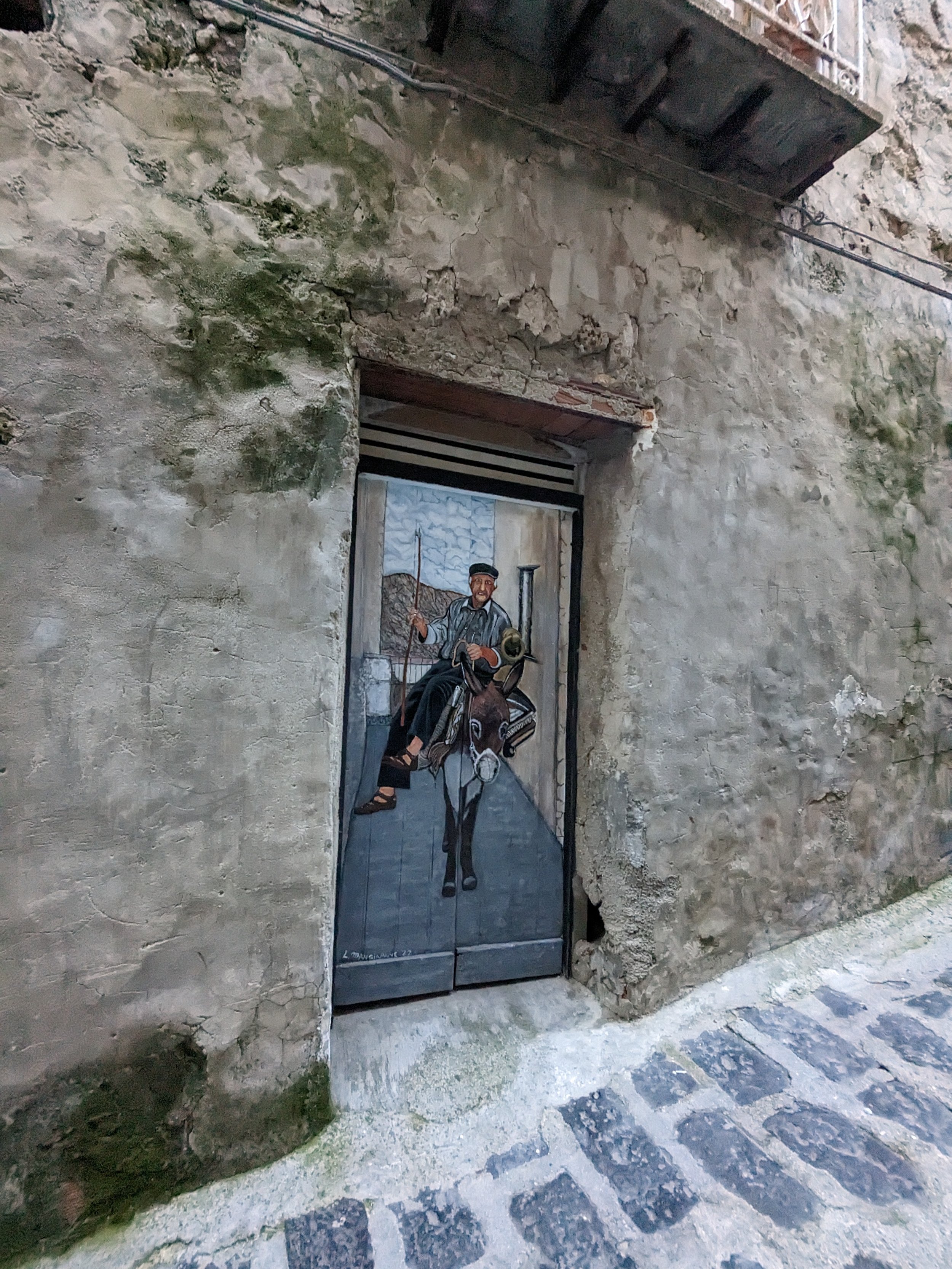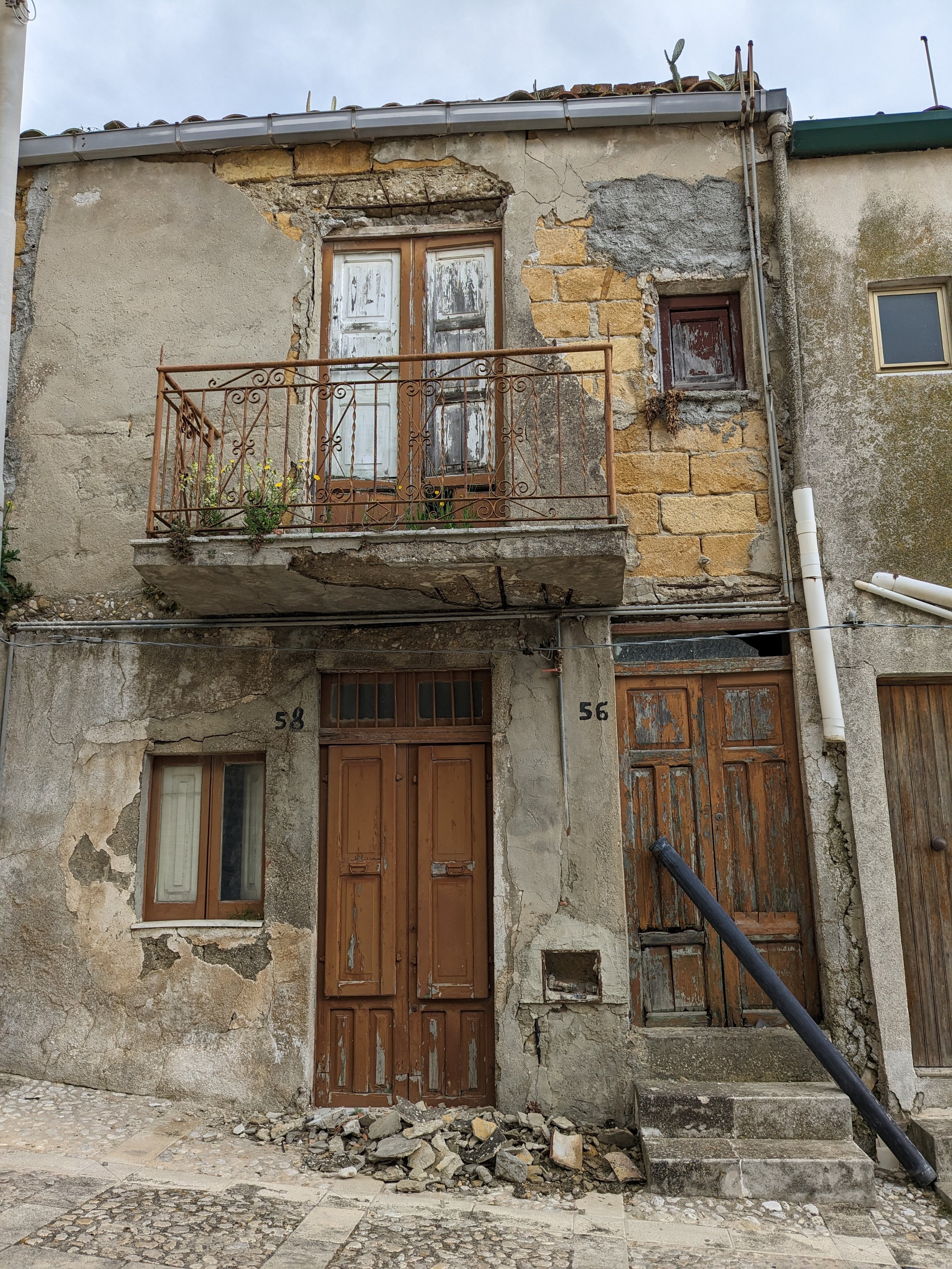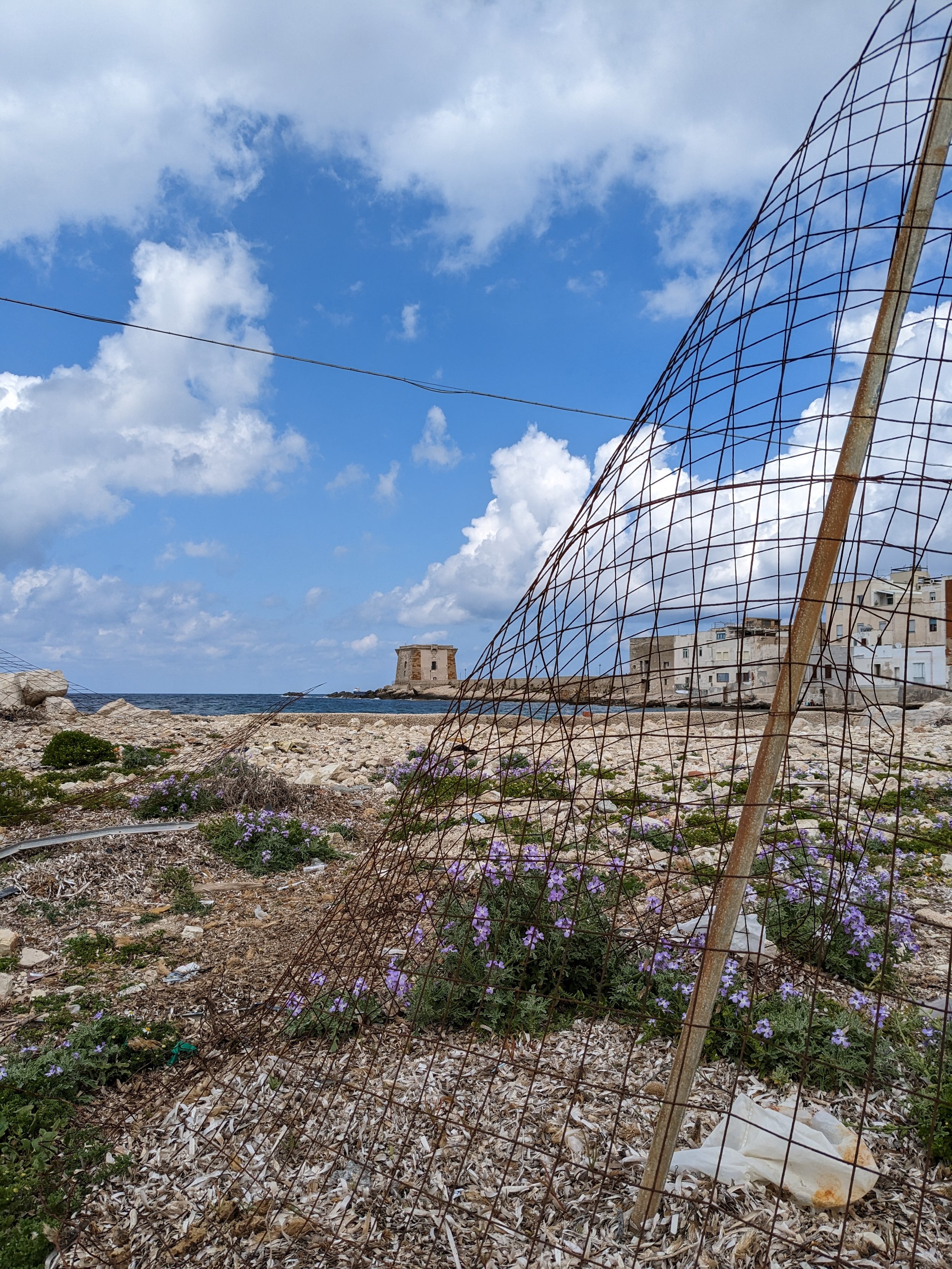
Reflections on
rural Sicily
A few field notes from the month I spent exploring intergenerational connections in rural Sicily
1.
Many of my Northern European pals and colleagues did a double take when I said I was travelling to Sicily as part of this trip — their general impression is that Sicilian’s intergenerational connections are in pretty good shape.
But (as ever) the reality isn’t straightforward. Italy has the fastest ageing population in Europe. Its rural areas, especially in the south, are demographically depleted after decades of migration of young people to cities and abroad in search of work.
This has left towns like Mussomeli in central Sicily with a concentration of older people living longer as the economy struggles and fewer younger people and fulsome family units are on hand to support.
(Photo: Street art in Mussomeli’s old town)
2.
To this end Mussomeli — where I was lucky enough to spend 12 days — is one of a growing number of rural towns which have used a €1 home scheme to attract foreigners to invest in the place in return for characterful and dilapidated properties with stunning views.
Danny McCubbin — an Aussie-turned-Brit-turned-Italian — arrived in 2019 drawn by the opportunity to bag himself a €1 house but decided to call this place home after falling hard for the town and its people. He set up The Good Kitchen in the town originally to provide ‘meals on wheels’ to anyone in the town who wanted them until he came to see…
(Photo: Mussomeli’s old town)
3.
… that it is physical gathering spaces for relationships and community that rural communities like Mussomeli are dearly in need of (more on why below).
So that’s what he has built with people from across the town including Calogera, a Nonna (grandma) and retired pasticceria chef; Frank, the owner of the town’s photography studio; and Laura, who is the person that ‘makes stuff happen’ as well as being one of the most beautifully put together people I’ve ever had the pleasure of meeting — the definition of ‘bella figura’.
After two years The Good Kitchen is growing into a place where people of different ages, nationalities, interests and backgrounds all come to connect over cooking classes, community meals, women’s circles and much more.
(Photo: Free Saturday yoga classes run by Argentinan Liu run in three languages for people of all abilities and none)
4.
Sicily’s rural transport infrastructure leaves rather a lot to be desired which impacts the ways in which people connect in familiar and surprising ways. Buses to nearby towns are few and far between, half built roads scatter the hills (relics of decades of corruption) and the roads that do exist are potholed obstacle courses. So the car is king here and over the years Mussomeli’s central Piazza Umberto had become a glorified car park. The narrow steep lanes that wind their way around town were once spaces and places for conversation and connection but can feel like rat runs for cars zooming in and out of the centre of town.
Change is on the horizon as the town looks forward to the completion of EU funded work to transform the piazza to an open, car-free public space. The Good Kitchen sitting on one edge of this piazza places it squarely(!) in the middle of the action and Danny has big plans to fill it with long tables for community meals to celebrate the piazza’s opening later this summer.
(Photo: One of the half build motorways that litter Sicily’s interior)
5.
Sicily is a place of ritual — both religious and secular. From the uniformed youth groups handing out olive branches on Palm Sunday to the family meals on rural ‘campagnas’ (farms) and The Good Kitchen’s Sunday meal for anyone in the town who fancies lunch and company.
Catholicism once offered the mainstay of rituals for connection and community but as religious fervour falters for some the need for new spaces for connection and community is rising. But in a place full of centuries-old tradition it’s not a straightforward endeavour as Danny can attest to.
(Photo: Trapani’s Good Friday procession)
6.
Despite the many decades of migration taking younger people away from the town for work it’s a sign that ‘something has gone wrong if an older person goes to a care home’ — said one of the board members of The Good Kitchen.
Multigenerational family households are commonplace, so too are the members of a family all living in different houses across the same town. Care in the home for young and old alike is still a top priority.
(Photo: View from the Good Kitchen on to Pizza Umberto mid-renovation)
7.
This ‘family first’ approach to care is just one part of a wider web of the customs, standards and behaviours that make up Sicilian pride. In many senses this is of course a good thing — it offers strong, reliable safety nets for many — whilst others experience it as ‘claustrophobic’. When those webs of relationships fail due to migration, bad luck or errant family members, Sicilians are extremely unlikely to accept, let alone ask for, a helping hand.
This means that Danny and The Good Kitchen’s relationships with people who might benefit from a helping hand in the form of food or company and connection develop slowly and respectfully. It’s only through trust and meaningful relationships that The Good Kitchen can offer what it can to people who might need meals or company — this is something that Danny expects will take many years to develop fully. For the kitchen to become part of Mussomeli’s fabric it must win the trust of the town with its consistency.
(Photo: Around Mussomeli)
8.
Despite the generational fractures I didn’t hear from anyone I met in Mussomeli (or across Sicily) that the intergenerational strains are reverberating through their political or cultural life in quite the same way as it feels in the UK.
Intergenerational wealth transfer between generations is strong with families seeing it as a sign of strength that older family members can support younger generations to buy property, cultivate farm land and live in the family home for as long as is needed. One explanation to this was offered by a staff member at a youth charity in Mussomeli: “our generations had it out already over the mafia, that experience offered us solidarity and connection we’re still enjoying”.
(Photo: Retired bus driver Pino sharing his campagna for an afternoon)
9.
It’s a place of independent, fighting spirit. “Everyone else has left, but we’re determined to stay'“ is how Enzo described his decision to stay in Polizzi Generosa the hilltop town of his birth, where he estimates just five babies were born last year. All his peers have left for white-collar jobs in cities or abroad. “To stay, we’ve had to create our own work”. And that they have done.
Enzo and Simona run a thriving hospitality business and are part of a farming cooperative called Verbum Caudo comprised of 11 young people growing chickpeas, tomatoes that need little water and grapes for wine, all with a shared determination to not let their rural places die.
(Photo: The rural town of Polizzi Generosa clings to a mountain ridge in Sicily’s interior)
10.
Lots of what I’ve described here seems (to me at least) to be enabled in part by a culture and its people who are good at downing tools, slowing down and stopping.
The rhythm of daily life involves lunch together at home during the ’siesta’ period of 1–3pm. The weekly rhythm of family life includes meals and intergenerational caring routines which often take priority over work commitments. The annual rhythm of family vacations and using the excuse of religious holidays to gather together (even when Catholicism means less than it once did to one group of friends I chatted to at Trapani’s Easter procession).
This seems to me not just a matter of ‘having more time’, but a matter of being a priority for most people I met.
(Photo: Deserted Trapani on Easter Sunday - a day marked by family meals and empty streets)









